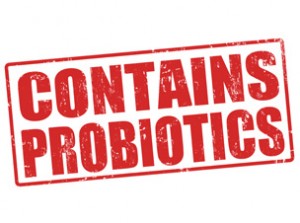By Steven Hutchings
 Probiotics are the tiny microorganisms that live in your gut. They occur naturally and influence a variety of functions, from gut health and weight management to skin condition and even depression. Now two new studies suggest we might add further benefits to that list: probiotics might help to curb high blood pressure and reduce the effects of inflammatory bowel and Crohn’s disease.
Probiotics are the tiny microorganisms that live in your gut. They occur naturally and influence a variety of functions, from gut health and weight management to skin condition and even depression. Now two new studies suggest we might add further benefits to that list: probiotics might help to curb high blood pressure and reduce the effects of inflammatory bowel and Crohn’s disease.
Another finding, published in January of this year, found that probiotics may be determined by geography. Folks in colder, northern climates had microflora linked to obesity, while people in warmer regions can thank their bacteria for helping to keep them lean.
The findings make sense. The gut houses trillions of these (mostly) helpful little organisms and have so much influence on well-being that Dr. Steven Lamm of The View argues the gut acts like a secondary brain. We’ve barely scratched the surface with probiotics and their health-boosting properties – and lowering blood pressure and helping people with Crohn’s appears to be among them.
Probiotics Linked to Lower Blood Pressure
A study published in the July 21 in the journal Hypertension found that probiotics, like those found in yogurt and supplements might help to reduce high blood pressure. The latter is a risk factor for heart disease and other health conditions, including diabetes.
This conclusion, after researchers analyzed nine studies of a combined 543 adults with normal or elevated blood pressure, all of whom took in probiotics.
Folks who consumed the most probiotics had an average systolic blood pressure reading of roughly 3.6 millimeters of mercury. Average diastolic blood pressure – the bottom number on a blood pressure reading – went down by about 2.4 mm/Hg compared to folks who didn’t consume probiotics on a regular basis.
The benefits of probiotics were most pronounced in people with blood pressure above 130/85, and who consumed multiple kinds of the bacteria rather than a single strain. Duration mattered too – people who took probiotics for less than two months did not have reduced blood pressure readings. Those who consumed probiotics for longer, and combined with healthy lifestyle factors to keep blood pressure down tended to see the most benefits.
 What it Means: The study does not prove a cause and effect relationship. Nor is it perfect – critics note it did not account for the varied amounts of probiotics consumed in each study and did not control for other factors that could have affected blood pressure.
What it Means: The study does not prove a cause and effect relationship. Nor is it perfect – critics note it did not account for the varied amounts of probiotics consumed in each study and did not control for other factors that could have affected blood pressure.
Still, it’s a promising finding. The results pave the way for further research into the link between probiotics and reduced blood pressure. And given that probiotics are generally well-tolerated, it’s not impossible that more doctors will recommend probiotics, when adopted as part of a healthy lifestyle, for high blood pressure and the health risks linked to it.
Diet Changes Affect Gut Bacteria
Another study published last month came with news of equal significance for patients with some chronic diseases, like Crohn’s and inflammatory bowel disease. The finding, that changes in diet can dramatically alter balance of gut bacteria could lead to monitoring systems for people with ongoing digestion problems.
The methodology: researchers monitored changes in bacteria of two people for over a year, done with stool samples (no one ever said checking bacteria was pretty!) collected daily to monitor the amount and types of bacteria present. As well, each subject used an iPhone app to track lifestyle factors, including diet, sleep, mood and exercise, which could affect gut bacteria.
Both people had an event during the study that affected their microflora. One got diarrhea while on a two week trip to a developing country. This person had significant changes to their balance of gut bacteria but it returned to normal on return to the U.S.
The second person got food poisoning from salmonella – a harmful bacteria you’ve no doubt heard of, along with E. coli and C. diff – which jumped in population from 10% to almost 30%. Likewise, this person’s helpful bacteria almost disappeared. They rebounded, eventually, to about 40% of the microbe population, but most were not the original strains.
What it Means: Diet changes probiotics in the gut – both populations of unique strains and the balance of good and harmful microflora. These changes can occur daily, according to the researchers, who note these fluctations tend to right themselves after a year.
The takeaway message here is that probiotics reveal patterns that might help people predict and prevent flare-ups of digestion ailments like Crohn’s and Inflammatory Bowel Disease. And there’s the obvious benefit, of beneficial bacteria like bifidobacterium and lactobacillus, which help establish a healthy balance of good versus harmful bacteria, described as 85/15 in No Guts, No Glory.
Where to Get Probiotics
You can get probiotics through diet or supplements. Digestive Science offers a high quality natural probiotic supplement with both IBS Relief System and Intensive Colon Cleanse. Or simply add these probiotic foods to your plate for some of the many (and increasing by the year) benefits linked to probiotics, like the ones we’ve talked about, along with better skin, stronger immune system and more.
Yogurt – Arguably the best-known source of probiotics, yogurt is an excellent way to put the helpful bacteria in your belly. Be sure the ingredient label says “live active cultures” and avoid products that advertize fruit in the bottom – they’re a hidden source of extra sugar.
Sauerkraut – German cuisine may not get the kudos that go to their French counterparts across the border, but it does boast sauerkraut, a powerhouse of probiotics leuconostoc, pediococcus and lactobacillus. You’ll need unpasteurized sauerkraut to get these benefits.
Note too that sauerkraut is packed with vitamins that may help fight infection.
Miso Soup – A staple of the Japanese diet, miso soup is a fermented soybean paste with a reported 160 different kinds of probiotics. The B vitamins and antioxidants in miso soup don’t hurt either, and it’s a very light calorie hit.
Soft Cheeses – Not all probiotics survive the arduous journey through your GI tract. The lactobacillus strains found in soft cheeses are some of the hardy ones. Cheese might actually protect probiotics as they make their way through you, and appear to benefit the immune system too.
 Kefir – You probably haven’t heard of kefir unless you’re a shepherd from the Caucasus Mountains. You’ll want to try kefir though for its abundance of probiotics, along with several beneficial yeast varieties.
Kefir – You probably haven’t heard of kefir unless you’re a shepherd from the Caucasus Mountains. You’ll want to try kefir though for its abundance of probiotics, along with several beneficial yeast varieties.
Sourdough – That tasty bread holding your sandwich together can help your digestion. Sourdough is an excellent source of lactobacilli.
Milk with Probiotics – An easy way to put probiotics in your tummy, acidophilus milk has been fermented with bacteria including lacobacillus acidophilus. You may find it labelled ‘sweet acidophilus milk’. Note you can also find probiotics in buttermilk.
Sour Pickles – Sour pickles? Yup, sour pickles – laugh if you like, but sour pickles that are not fermented in vinegar are generally high in helpful bacteria and make for good digestion.
Prebiotics – Probiotics are the live bacteria you get from food or supplements. Prebiotics are foods that nourish the good bacteria that already live in your system. Find prebiotics in asparagus, bananas, oatmeal, red wine, honey, maple syrup and legumes. Or combine them with the foods mentioned in this article for a probiotics boost to keep your GI tract in top form.
+Steven Hutchings




